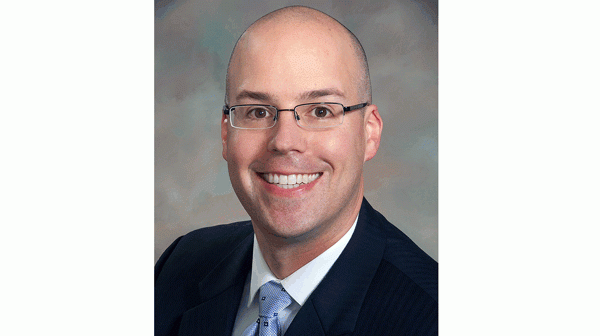
On June 9, 2015, Steven J. Stack, MD, FACEP, will make history as the first emergency physician to be named President of the American Medical Association (AMA). He will be sworn in for his one-year term as the 107th President of the AMA at the association’s annual meeting. Dr. Stack recently spoke with ACEP Now Medical Editor-in-Chief Kevin Klauer, DO, EJD, FACEP, about the challenges of serving as the second-youngest AMA President. He also commented on efforts to repeal use of the Sustainable Growth Rate (SGR) formula to determine physician payments via bill H.R.2, which had just been passed in the U.S. House of Representatives at the time of this interview.
Explore This Issue
ACEP Now: Vol 34 – No 05 – May 2015Here we present part one of the conversation. Part two appeared in the June issue.
Dr. Kevin Klauer: You’ve spent the last year as President-Elect of the AMA. How do feel about the year ahead?
Dr. Steven Stack: It’s obviously a great privilege and honor in any sense to be able to serve in that role. It’s also really cool to be able to be the first emergency physician to have ever had that position. This is something of a complete cycle for our specialty since our journey toward the formal political process of recognition began on the floor of the AMA House of Delegates. John Wiegenstein, MD, and others had to fight very, very hard in that venue to persuade a dismissive and unconvinced medical profession that there was a need and a value for the specialty that you and I clearly know there’s a value and a need for. It’s really neat to close that circle. Just for your information—because I know this more clearly than I did before—at the age of 43, I will be the youngest president of the AMA since 1854, and I will be the second youngest of the 170 presidents. The youngest was Dr. Charles Pope in 1854. He was 36 years old. So to paraphrase whoever singer that was—Vanilla Ice?—“can’t touch that,” but it will be pretty cool to be so young in over 160 years of that position.
KK: Absolutely, and you’ll be able to instruct us on many, many different areas of medicine and policy, so I will instruct you on hip-hop. That was MC Hammer, my friend.
SS: Ah, MC Hammer. I’m sorry. That’s right. That’s my foray into popular culture.
KK: As far as scheduling and different responsibilities go, how much different will it be for you after June 9?
SS: I’m in a position where, because of the work I’ve done on health information technology and what I’ve done with my interactions with certain facets of the federal government, my schedule right now is at a presidential pace. My life will look something like this: I will average between 50 and 55 clinical hours in the emergency department every month, and I will travel probably more than 180 days for the AMA this calendar year. I will have innumerable conference calls wedged and peppered during transition points in airports, hotel meeting rooms, office places, or at home. It will be a very, very brisk pace, and I will obviously try very, very hard to build little pockets of time to make sure I remain familiar with my wife and my daughter.
‘They’ll always patch it.’ Well, that’s a risky assumption when you see that Congress has played Russian roulette with the entire nation’s economy through the debt ceiling debates when they shut the government down. If…people just take it as a given that all these patches are going to happen, they have not paid attention to contemporary politics. —Steven J. Stack, MD, FACEP
KK: Will your position provide some unique opportunities for them travel-wise or being exposed to things that they might not have otherwise experienced?
SS: Generally, no—because these trips are so focused on the task or on work, they don’t come with me. Two other reasons: My daughter is appropriately busy for a fourth grader, with her soccer and martial arts schedules and horseback riding, which she loves to do. My wife is a practicing pediatric allergist. She has a full-time practice, and she is the owner of the practice. She and my daughter have very busy lives on their own and can’t just up and come with me on trips. The one exception for that: I will attend the World Medical Association, which meets twice a year. It’s like the United Nations for physicians, and I get to travel around the world and meet with my physician colleagues who represent the other nations of the world. It really is a true conclave of the top leadership of the profession of medicine across the globe. [My wife], Tracie, will go with me on some of those trips because it’s such a novel and once-in-a-lifetime experience.
KK: I’m glad that she’ll get to experience some of this with you. Let’s get into some policy issues. Regarding the recent developments with the Sustainable Growth Rate (SGR) repeal, what are your feelings about the current success, and do you think there are any devils in the details, anything in fine print, any concessions that may soften the potential benefit of this repeal for us?
Pages: 1 2 3 | Single Page





2 Responses to “Dr. Steven Stack Discusses His Presidency of the AMA; Repeal of SGR”
May 17, 2015
Louise B Andrew MD JDWe are so proud of Steve. Who could possibly make a better leader and spokesperson for all of the house of medicine than an EP with his background, training, experience, eloquence, charisma, uncommon wisdom, and youthful energy?
August 6, 2015
AMA, CMS Announce ICD-10 Grace Period Specifics - ACEP Now[…] a transition period to help ease the switch from ICD-9 to ICD-10. According to AMA President Steven Stack, MD, an emergency physician and ACEP member, the agreement is intended to “ease the transition to […]